20 years of Forest Information Technology (FIT): An anniversary of international cooperation
The international Master's study programme Forest Information Technology (FIT) celebrated its 20th anniversary with a cross-border anniversary event. The celebrations began on Friday 26 September at the Eberswalde University for Sustainable Development (HNEE) and continued on Monday 29 September at the Warsaw University of Life Sciences (WULS-SGGW).
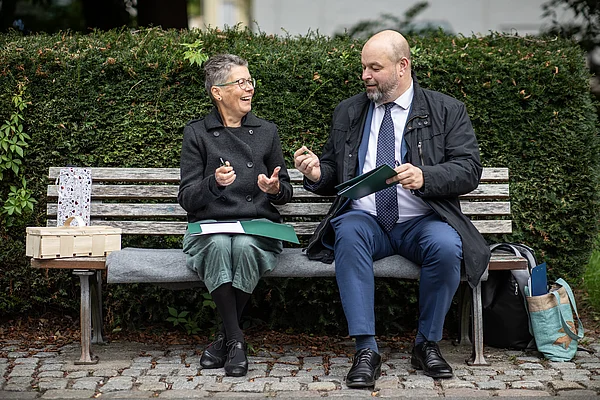
Renewal of the Memorandum of Understanding.
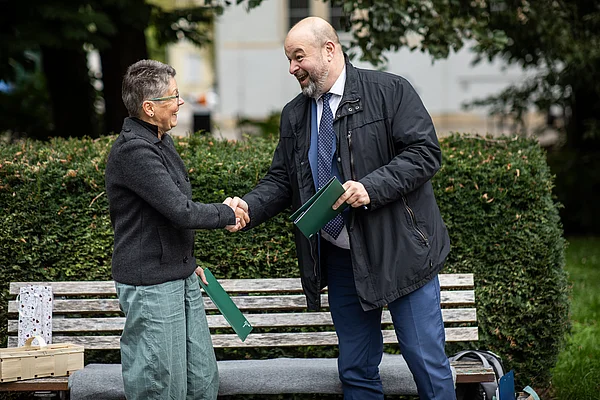
Prof. Dr. Uta Steinhardt (HNEE) and Prof. Dr. Michał Zasada (Rector of WULS-SGGW) seal the symbolic renewal of the Memorandum of Understanding on the 20th anniversary of the FIT degree programme with a handshake.
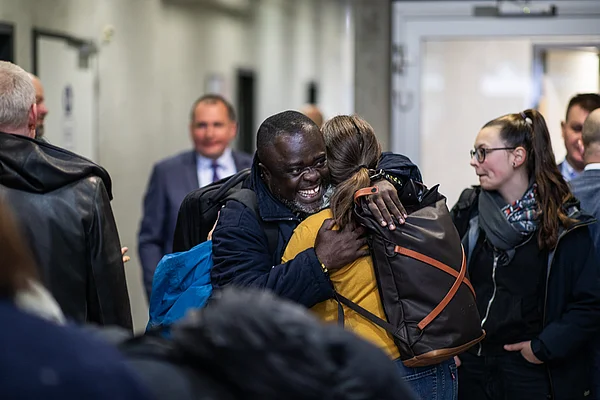
It's good to see you again – a warm hug at the 20th anniversary of the FIT degree programme.
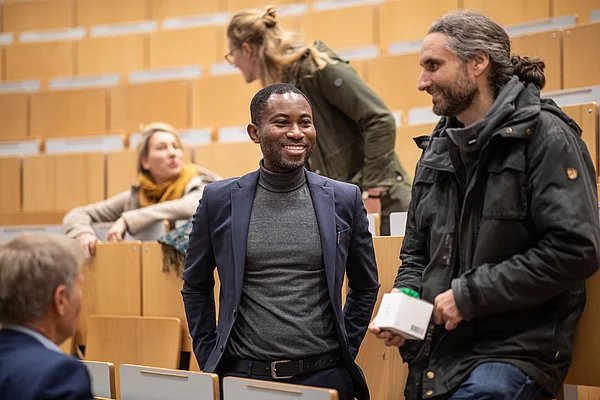
Alumnus meets alumnus: Former students of the FIT programme forge new connections at the anniversary celebration and reminisce about their student years.
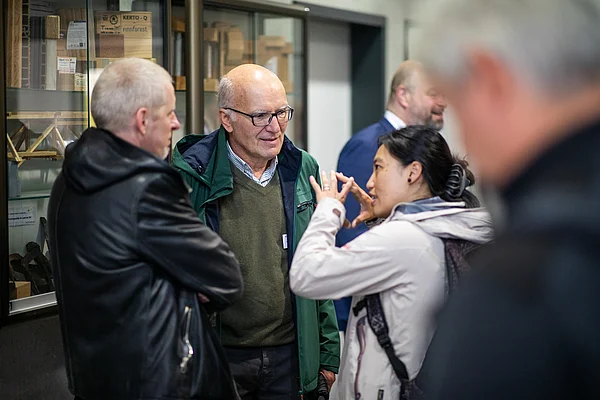
Alumnus meets lecturer: Personal exchanges between former students and teachers characterised the celebrations marking the 20th anniversary of the FIT degree programme.
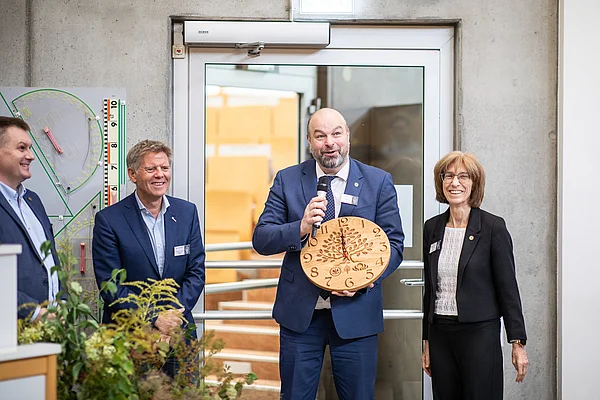
Übergabe des Gastgeschenks zum 20-jährigen Jubiläum des FIT-Studiengangs durch Vertreterinnen und Vertreter der HNEE und WULS-SGGW. Foto (v. l. n. r.): Prof. Dr. Karol Bronisz (Koordinator des Studiengangs FIT und wissenschaftlicher Mitarbeiter am Fachgebiet Forstbetriebswirtschaft, Dendrometrie und Forstökonomie, Prof. Dr. Jan Peter Mund (Studiengangsleiter FIT, Professor für GIS und Fernerkundung, Akademischer Direktor des Biosphere Reserves Institute), Prof. Dr. Michał Zasada (Rektor der Warsaw University of Life Sciences (SGGW)), Prof. Dr. Marta Aleksandrowicz-Trzcińska (Dekanin der Fakultät für Forstwissenschaften der Warschauer Universität für Lebenswissenschaften (WULS-SGGW))

Symbolische Gastgeschenke unterstreichen die Verbundenheit zwischen HNEE und WULS-SGGW anlässlich des 20-jährigen Jubiläums des FIT-Studiengangs.
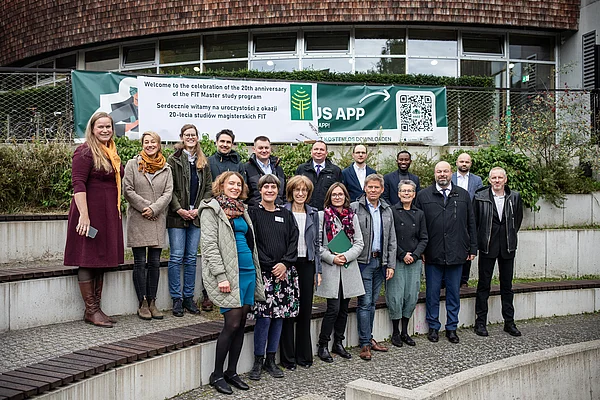
Wegbegleiterinnen und Wegbegleiter des Masterstudiengangs Forest Information Technology (FIT) beim 20-jährigen Jubiläum vor dem Wilhelm-Pfeil-Auditorium auf dem Waldcampus der HNEE. V. l. n. r. Reihe unten: Manuela Pelz (Zentrum für Internationale Angelegenheiten), Dr. Evelyn Wallor (FIT Studiengangskoordinatorin), Prof. Dr. Marta Aleksandrowicz – Trzcińska, Dekanin der Fakultät Forstwissenschaften der Warsaw University of Life (WULS-SGGW), Irena Łukawska (Wissenschaftliche Mitarbeiterin, Fachgebiet Forstbetriebswirtschaft, Dendrometrie und Forstökonomie), Prof. Dr. Jan Peter Mund (FIT Studiengangsleiter, Professor für GIS und Fernerkundung, Akademischer Direktor des Biosphere Reserves Institute), Prof. Dr. Uta Steinhardt (Vizepräsidentin für Studium und Lehre), Prof. Dr. Michał Zasada (Rektor SGGW), Dr. Michał Brach (Assistenzprofessor für GIS, Institut für Forstwissenschaften, Fachgebiet Geomatik und Raumplanung) V. l. n. r. Reihe oben: Prof. Dr. Britta Gossel (Leiterin der Graduate School an der HNEE, Studiengangsleiterin SESIN, Katharina Kuhlmey (Alumna FIT), Kathrin Hahne-Rees (Alumna FIT), Michl Lanz (BMW / GROUP ALUMNI), Prof. Dr. Karol Bronisz (Koordinator des Studiengangs FIT und wissenschaftlicher Mitarbeiter / Assistent, Fachgebiet Forstbetriebswirtschaft, Dendrometrie und Forstökonomie), Dr. Kamil Bielak (Außerordentlicher Professor (Adjunct), Fachgebiet Waldbau), Prof. Dr. Jens Müller (HNEE-Professur für Environmental Big Data Analytics), Dr. Addo Korateng (Alumni), Dr. Łukasz Kwaśny ( Außerordentlicher Professor (Adjunct), Institut für Forstwissenschaften, Fachgebiet Geomatik und Raumplanung)
At the start of the anniversary event, Prof Dr Michał Zasada (Rector, WULS-SGGW) and Prof Dr Uta Steinhardt (Vice President for Studies and Teaching, HNEE) symbolically signed the Memorandum of Understanding once again in the park on Weidendamm in Eberswalde. This agreement laid the foundation for the successful international degree programme cooperation 20 years ago.
"FIT has been connecting forests, science and digital technologies for 20 years - and shows how international cooperation shapes the future," emphasised Prof. Dr Uta Steinhardt.
Following the symbolic kick-off, the HNEE forest campus opened its doors for the official anniversary ceremony. Brandenburg's Science Minister Dr Manja Schüle opened the celebrations with a video message before Prof. Dr Uta Steinhardt, Prof. Dr Britta Gossel (Head of the Graduate School, HNEE), Prof. Dr Jan-Peter Mund (Head of study programme FIT, HNEE) and Prof. Dr Michał Zasada (Rector, WULS-SGGW) traced the development of the degree programme - from its beginnings to numerous scientific milestones and future prospects.
The programme was enriched by two keynote speeches by Dr Lars Waser (Swiss Federal Research Institute WSL Zurich) and Prof. Dr Andreas Bolte (Thünen Institute of Forest Ecosystems). Particularly impressive were the contributions from the alumni, who provided insights into their diverse career paths and fields of research:
- Prof Dr Addo Koranteng (Kumasi Technical University, Ghana), the first FIT graduate in 2007 and winner of the DAAD prize at the time
- Michael Lanz (BMW Group), who made the switch from Forestry to the development of autonomous driving technologies thanks to FIT
- Dr Raphael Manu (University of Göttingen), who has embarked on an academic career and is researching carbon sequestration in tropical forests
- Kathrin Hahne-Rees (Federal Office for Agriculture and Food), a 2017 FIT graduate who now heads the Digital Control Systems department as part of the implementation of the European Deforestation Regulation
- Ping Sun (Leuphana University of Lüneburg), 2021 graduate, now a PhD student, whose academic career began in China and who regularly travels to Rwanda for research visits
- Muhammed Sinan (BOKU Vienna), from Kerala, a 2022 FIT graduate who has since completed a PhD and won the international Global Challenges University Alliance 2030 (GCUA 2030) Award for pioneering research in the field of sustainable development in 2024
Their stories illustrated the wide range of career paths and underlined the international orientation of the degree programme.
The anniversary celebration also offered space to look back: co-initiators such as Dr Astrid Schilling and in particular Prof. Dr Alfred Schulz, co-founder of the FIT degree programme, recalled the history of its origins and the successes achieved. Together with current and former students, it became clear that FIT is not only a success story of the past 20 years, but also a strong promise for the future.
Or, as the partners in Warsaw put it: "FIT4ever!"
About HNEE
The Eberswalde University for Sustainable Development (HNEE) is a driving force for sustainable development with its holistic sustainable orientation, its unique range of degree programmes geared towards future-relevant topics and as a strong institution in the field of sustainability research. Around 2,300 students from around 60 nations study and more than 400 employees teach, research and work at the modern campus university. HNEE's mission is to drive the transformation towards a sustainable society by developing load-bearing capacity model solutions and equipping students with the necessary design skills.
About WULS-SGGW
The Warsaw University of Life Sciences - SGGW is one of Poland's largest and most traditional universities specialising in agricultural, forestry and environmental sciences. Around 25,000 students benefit from a broad spectrum of subjects ranging from natural sciences and engineering to social sciences and economics. With international research, practical training and strong partner networks, WULS-SGGW makes a significant contribution to sustainable development in Europe and worldwide.